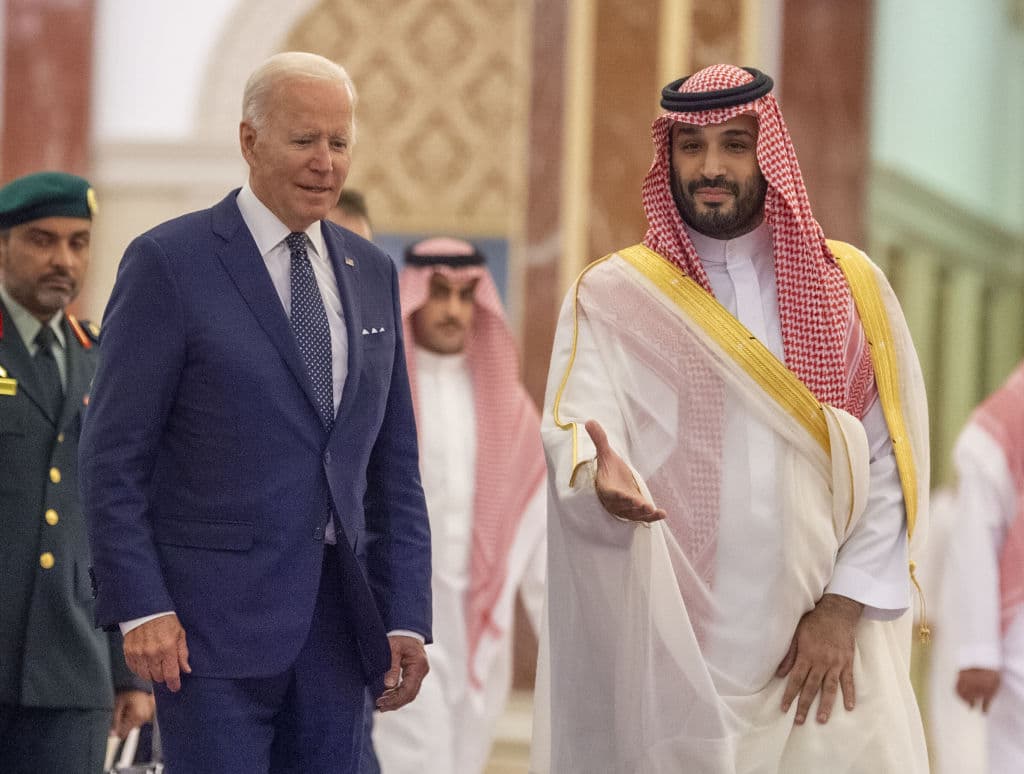Thanassis Cambanis is an author, journalist and the director of Century International at the Century Foundation.
Editor's note: This article is adapted from a paper presented at a policy workshop on the proposed U.S.-Saudi security agreement, which DAWN co-hosted with Georgetown University's Alwaleed Center for Muslim-Christian Understanding.
From the onset of Joe Biden's presidency, his top advisers argued that a new, ironclad alliance between the United States and Saudi Arabia would catalyze cascades of progress in the Middle East. Supposedly, a Saudi Arabia reassured by a new "strategic partnership" with Washington—and under America's treaty protection—would normalize relations with Israel and limit China's inroads in the Gulf. Regional conflict would subside.
This was magical thinking, not sound analysis or strategy. A formal defense alliance was always primarily about brokering another Arab normalization agreement for Israel, sidelining the Palestinians and keeping in place the existing and de facto U.S.-Saudi economic alliance. American policymakers might imagine that Saudi Arabia, once elevated to a U.S. treaty ally on par with Japan and Australia, will stabilize the Middle East, but history suggests the opposite: The bigger the blank check, the greater the moral hazard and riskier the conflicts.
The Hamas-led attacks into southern Israel on October 7, 2023 upended the Middle East and turned life and security upside down for millions across the region. But somehow, despite that cataclysm, the case for the U.S.-Saudi alliance has never wavered in Washington. It was an idea too big to fail, apparently immune to facts.
As one senior U.S. national security official put it during a private meeting, "Before October 7, the headline was a Saudi pact that normalizes Israel, and the subheading was Palestinian statehood. Now, we've flipped the order." Such glib talk and imagineering should make clear just how empty the entire idea is. A U.S.-Saudi defense pact is good for no one except Saudi Arabia and its crown prince, Mohammed bin Salman, and will very likely trigger more of the violence and instability it is supposed to contain.
American policymakers might imagine that Saudi Arabia, once elevated to a U.S. treaty ally on par with Japan and Australia, will stabilize the Middle East, but history suggests the opposite.
- Thanassis Cambanis
The overriding logic of security treaties is to create more stability by limiting the risks of military escalation. But judging by recent history, Saudi Arabia as a U.S. treaty ally would be more likely to initiate conflicts or get attacked. At every juncture since the 1990 Gulf War, Saudi Arabia has repeatedly engaged in brinkmanship and escalatory behavior in the region, convinced that the United States will have its back. And the kingdom has learned what to expect from a deeper alliance by looking at Washington's endless indulgence of Israel, which receives an express delivery of U.S. weapons each time it defies an American "red line."
In practical terms, a formal U.S.-Saudi defense alliance would make the region's instability and political entanglements measurably worse. With a mutual defense pact, which Riyadh desperately wants, the United States would be obligated to protect the kingdom. In the event of another direct attack by Iran or the Houthis, like the drone and missiles strikes on oil facilities in eastern Saudi Arabia in 2019, the United States would have to intervene directly—or downplay an attack, thus undermining the alliance and, with it, America's other treaty alliances around the world. Conceivably, the United States could defend Saudi Arabia with relative restraint, for example by deploying air defenses. But historically, Saudi Arabia, like other reckless Gulf monarchies at various recent points of crisis, has exerted pressure to drag the United States directly into conflicts, from the Saudi-led war in Yemen to its sometimes-cold, sometimes-hot conflict with Iran.
Riyadh is already trying to emulate the Israeli approach as it seeks the additional leverage of a treaty alliance. Israel can count on U.S. support on the basis of their institutional relationships and deep-rooted, historically grounded political sympathy in Washington. Saudi Arabia is unlikely to ever command the same emotional identification as Israel from the U.S. political class. But it does have deep institutional relationships, as well as major shared interests built on the kingdom's central role in oil markets and as an owner of U.S. public debt via Treasury bonds.
The U.S.-Saudi relationship already exerts a corrosive force on the wider Middle East. It casts the United States not as a balancing major superpower but as a local belligerent, especially following the Obama administration's support for the Saudi-led war in Yemen in 2015. It undermines governance and state institutions in Saudi Arabia itself, by reducing incentives for reform, and in other Arab countries whose politics are distorted by Riyadh's regional policies. The U.S.-Saudi relationship also intensifies the moral hazard that encourages maximalists in the region to recklessly gamble on armed conflict.
America and Israel engage in the same dynamic to a much deeper and more consequential degree. A formal military alliance or deeper entanglement between Washington and Riyadh will increase the likelihood of open conflict—with the Houthis, with Iran. It would also further the abandonment of Palestinians and Palestine by Arab states, which have already cast their lot with Israel and the United States in favor a policy of Palestinian oblivion, by which they mistakenly believe that occupation and marginalization will eventually dissolve Palestinians as a political factor, if not as an actual population.

Washington's interest in a Saudi defense pact fits in a wider, if still incoherent, context that is best exemplified by the Abraham Accords, which paved the way for Israel to establish diplomatic relations with the United Arab Emirates and Bahrain. U.S. strategy in the Middle East, in theory, seeks to secure both Israel and energy markets without drawing the United States directly into regional wars. That strategy, however, has been in shambles for decades. The Abraham Accords, brokered in the last months of Donald Trump's presidency, achieved none of their lofty strategic goals, if those were even credible at the time, since normalization involved "peace" between countries that had never formally been at war. Four years after the Abraham Accords recognized "the importance of maintaining and strengthening peace in the Middle East," the region is deadlier and more volatile than at any point in living memory.
Through it all, the United States, despite still being the dominant military power in much of the Middle East, has managed to erode its own influence and standing. What explains this disjuncture? America micromanages regional affairs—unsuccessfully—and then surrenders any big-picture strategic aims to states that rely on its military protection and largesse. America takes sides in regional disputes, becoming so mired in conflicts that it has lost the leverage of imperial distance. America is both transactional and moralistic, personalistic and imperial, so it reaps the benefits of neither approach.
Strategically, a world-spanning power like the United States—or China, the European Union, perhaps even Russia—should intervene carefully in regions of interest. The major power seeks to pursue its own interests, advance the interests of its local partners, and balance its many competing concerns against the narrower preferences of local actors. That's the theory, at least. In the Middle East, however, the United States has categorically jumped from behaving as a major power—whether it pursues an interventionist tack as it did after 9/11, or offshore balancing, as it did previously—to behaving as just another regional power. Too often, the United States reduces itself to the role of local rival or coalition member, whether in military or political disputes. On rare occasions, like the Saudi-Qatar spat from 2017 to 2021, Washington takes an appropriate distance, refusing to take sides and even mediating. But on most regional matters, despite its status as military colossus and superpower, the United States dives into the weeds, taking sides on the most minuscule issue.
As a result of this mismatch between means and goals, the United States has produced outsized destructive impact—fueling wars, destabilizing regional dynamics, eroding the Arab state structure and rewarding Israel's rightward, maximalist shift—while achieving diminishing returns on core U.S. interests.
A U.S.-Saudi defense pact is good for no one except Saudi Arabia and MBS, and will very likely trigger more of the violence and instability it is supposed to contain.
- Thanassis Cambanis
Even without a new defense pact with Saudi Arabia, the contours of U.S. policy in the Middle East are clear—with obvious problems. American strategy prioritizes partnerships with Israel and Saudi Arabia above all others in the region, with primacy given to the Israel alliance if its interests diverge from those of Saudi Arabia. From this vantage point, it makes sense for Washington to bring Israel and Saudi Arabia into greater convergence, through the purported "grand bargain" of Israel-Saudi normalization and a U.S.-Saudi defense treaty. But what would that mean for the rest of U.S. policy in the region?
America's three core interests in the Middle East are either ill-defined, outdated or both. These interests are Israeli security, as defined not by Washington but by Israel; counterterrorism, as defined by a bygone, 9/11-era "war on terror" policy and mentality; and oil market stability centered on protecting Saudi Arabia, which is no longer the world's largest oil producer. A U.S.-Saudi alliance that is more binding than the existing partnership would accelerate the corrosive trends in the region linked to American policy.
The U.S. partnership with Israel is an anomaly in the region; it cannot be explained by strategic interests. The United States regularly sacrifices its interests in order to enable Israeli policies and actions that violate U.S. law and run counter to declared U.S. interests, or both. With other regional powers, Washington is less indulgent and more willing to operate transactionally. Saudi Arabia, from its perspective, is pursuing a logical policy: leveraging American loyalty into a defense pact. It wants the type of partnership that America and Israel have. That seems an impossible goal today, but it could still develop over time.
No matter what happens, it seems clear that the Palestinian people and Palestinian statehood will continue to be sidelined. Palestinian rights and self-determination have never been more devalued than now after a year of brutal war in Gaza—an Israeli war that would have been impossible without open-handed U.S. support. It is also a war that has passive support in the region from Saudi Arabia and other Arab states.
A Saudi defense pact would lock in the worst elements of the regional status quo and compound U.S. policy failures. An alliance with Saudi Arabia would not create a new U.S. "partnership" or lead to more "burden-sharing" or defense cooperation. It would only lead to moral hazard.






































